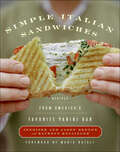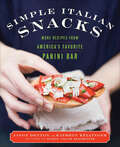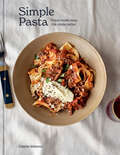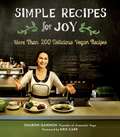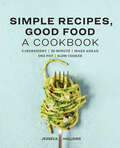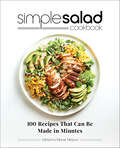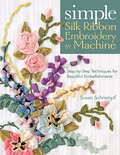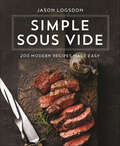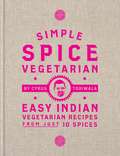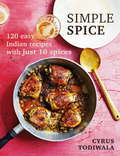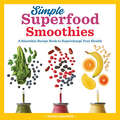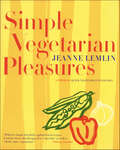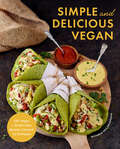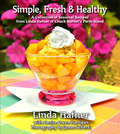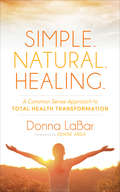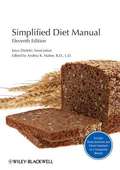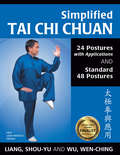- Table View
- List View
Simple Italian Sandwiches: Recipes from America's Favorite Panini Bar (Simple Italian Ser. #1)
by Kathryn Kellinger Jennifer Denton Jason DentonQuick and easy Italian sandwich recipes that offer maximum flavor with minimum cooking.With nothing more than a panini grill, a toaster oven, and a few simple ingredients, Jennifer and Jason Denton bring the fresh, robust flavors of Italy to your home table in Simple Italian Sandwiches.Eating in Italy is all about simple pleasures, relaxing with good company, and savoring fresh, no-frills foods like traditional toasted panini, crustless tramezzini, and crunchy bruschetta. In Simple Italian Sandwiches, Jennifer and Jason Denton offer up a collection of recipes for these classic bread-based dishes, plus condiments, antipasti, and salads that are easy enough for the novice cook yet tasty enough for anyone with a sophisticated palate. From Soppressata, Fontina, and Arugula Panini, to Mozzarella and Basil Pesto Tramezzini, to Roasted Butternut Squash, Walnut, and Asiago Bruschetta, the dishes can be prepared in minutes and require minimal cooking.With simplicity the governing rule for today’s busy schedules, Simple Italian Sandwiches is the ideal cookbook for anyone who wants to prepare vibrant, flavorful food for family and friends, and then sit down and enjoy it with them.Praise for Simple Italian Sandwiches“Perfect in its simplicity . . . An accessible, comprehensive guide to the ingredients and techniques (often involving a panini grill) that yield their delicious signature variations on the Italian pressed sandwich . . . Warm and inviting guides to a rustic cuisine they love, the Dentons include sections on aperitifs, antipasti and salads—and put the pleasures of an Italian tradition within the reach of every American home cook.” —Publishers Weekly
Simple Italian Snacks: More Recipes from America's Favorite Panini Bar (Simple Italian Ser. #2)
by Kathryn Kellinger Jason DentonThe authors of Simple Italian Sandwiches return in Simple Italian Snacks with delicious, elegant, easy-to-prepare bites for entertaining, lite dining, and more.The European culinary tradition of small plates have become a staple of American dining and have helped usher in a new way to eat, a relaxed way of socializing and a chic way of entertaining. Lively, fun, sophisticated, Simple Italian Snacks by Jason Denton and Kathryn Kellinger includes recipes and tasting combinations perfect for this style of dining.Here are easy, do-ahead recipes for any event—an afternoon by the pool, a fireside grill with friends, dinner for two, a meal for a crowd—all that can start as hors d’oeuvres or be built into a meal. Versatility, variety and great taste are the essential ingredients of such dishes as:Artichoke Gratin with PecorinoSweet Fennel Sausage PaniniRice BallsChocolate BiscottiShallow Fried Soft Shell Crab with Red Pepper Mayonnaise and ArugulaPorotobello and Pancetta Bruschettaand Shrimp, Celery, and Sweet Onions SpiediniFun, simple, and wonderfully delicious, the dishes in Simple Italian Snacks are sure to inspire and delight every palate.
Simple Pasta: Pasta Made Easy. Life Made Better. [A Cookbook]
by Odette WilliamsA gorgeous collection of simple, tasty pasta recipes you&’ll return to again and again, any night of the week, from the author of the beloved Simple Cake.&“Pasta deliciously portrayed in all its rustic elegance.&”—Stanley Tucci, New York Times bestselling author of Taste: My Life Through FoodIn Simple Pasta, Odette Williams makes homemade pasta easy, fun, and delicious. With just three base doughs, there are endless possibilities for creating memorable, transporting meals with friends and family. Of course, if you prefer (or just need the convenience of) store-bought pasta, that&’s always an option too. Discover new favorite and beloved classics, like:• Beet and Carrot Agnolotti with Sage-Hazelnut Butter• Creamy Wild Mushroom Gnocchi• Cacio e Pepe• Carbonara• Beef Short Rib Ragù and Pappardelle • Zucchini and Basil Casarecce• Wicked White Bolognese• Crispy Italian Sausage and Broccolini Orecchiette Peppered throughout the book are recipes for side dishes, drinks, mains, and desserts, helping anyone recreate the laid-back elegance of la dolce vita at home. Seasonal menus showcase produce at its prime, creating pasta dishes that are singular and memorable. In Simple Pasta, Odette welcomes you to experience the everyday joy of pasta with the people you love.
Simple Pleasures of the Garden: Stories, Recipes & Crafts from the Abundant Earth (Simple Pleasures Series)
by Susannah SetonA collection of gardening tips, recipes, crafts, gift ideas, tales, and more from the author of Every Garden Is a Story.Simple Pleasures of the Garden is a treasure chest of tips, how-to&’s, stories, and trade secrets gathered together in one beautiful book. Organized by season, the hundreds of suggestions and recipes present a profusion of ways to celebrate the bounty of the Earth all year round. Projects include handcrafted lotions and oils, baskets and wreaths, potpourris and floral waters, along with dozens of simple, inexpensive home decorations and easy-to-prepare recipes that utilize all of your garden&’s harvest. From compost tea to confetti corn chowder, Simple Pleasures of the Garden will inspire you to bestow the comforts and charms of your garden on family and friends.
Simple Pleasures of the Kitchen: Recipes, Crafts & Comforts from the Heart of the Home
by Susannah SetonA collection of recipes, crafts, and activities to bring your family together in the kitchen, from the author of Simple Pleasures of the Garden. The kitchen really is the heart of the home. It&’s the first place family and friends gather, not only to prepare and eat food, but to chat, sip tea, snack on home-baked cookies, unwind after a tough day, and reconnect with loved ones. The latest in the Simple Pleasures series of books, Simple Pleasures of the Kitchen captures the essence of the kitchen. It offers a cornucopia of recipes, food-based crafts, food facts and tips, and family activities, as well as stories from kitchens around the world sure to warm anyone&’s heart, no matter what the weather. Organized by season, the book offers: Spring Flings, The Savor of Summer, Autumn&’s Abundance, and Cozying Up in Winter. Recipes include comforting mashed potatoes, fresh summer risotto, delicious meatloaf, and heart-warming brownies and popovers. The super-simple jam recipe will go great with popovers, or as a gift in jars you&’ve decorated yourself. You can satisfy your sweet tooth and your soul at the same time! Susannah Seton&’s Simple Pleasures books continually delight readers with their down-home recipes, crafts, and activities that bring the whole family together. Don&’t miss this one.&“This enchanting and entertaining book reminds us of the importance of these times, how the simplest of events and day-to-day activities all blend to create cherished memories.&”—Jonathon King, cofounder of Stonewall Kitchen, from the Introduction
Simple Pleasures: Easy Recipes for Everyday Indulgence
by Emma FontanellaRediscover the joy of cooking simple food using fresh, everyday ingredients.With easy recipes and time-saving techniques for your favorite pastries, breads, cakes, pasta, pizza, cookies, and more, you&’ll find something to satisfy your sweet tooth—or your carb cravings. Cooking and baking don&’t have to be time consuming or difficult. With the right techniques, even the most daunting dishes can be simple to master. Chef Emma Fontanella is known for her ability to translate complex methods into approachable recipes that yield amazing results. Utilizing the conveniences of a modern kitchen, she has developed an indispensable collection of classic desserts, comfort food favorites, and everyday meals, all without sacrificing texture or flavor.Indulge in the simple pleasure of comfort classics such as The Fluffiest Cinnamon Rolls and Melt-In-Your-Mouth Glazed Donuts, or curl up with a cozy bowl of One-Pot Mac and Cheese or Three-Ingredient Fettuccine Alfredo.A section on foundational techniques provides detailed instruction on making and decorating cakes, working with yeast-raised doughs, preparing pasta, and more. Armed with Emma&’s thoughtful instructions and labor-saving shortcuts, you&’ll be able to execute everything from Cheater&’s Artisan Croissants to a stunning fresh Strawberry Cake with confidence. Simple Pleasures includes:Over 100 recipes for breakfasts, breads and baked goods, pasta dishes, celebration cakes, and holiday bakingTime-saving techniques and pastry chef shortcuts for restaurant-quality results with a fraction of the effortSuperfast microwave snacks that cook in a minuteNostalgic childhood favorites, such as Instant Frozen Yogurt and Homemade Peanut Butter Cups
Simple Recipes for Joy
by Sharon GannonMore than 200 delicious vegan recipes from the world-renowned founder of the Jivamukti yoga method and the New York City Jivamuktea Café Since 1984, Jivamukti yoga has been synonymous with a new way of living: peacefully, healthfully, and consciously. Jivamukti's dedicated instructors and message of kindness have inspired a global revolution. In 2006, Sharon Gannon and David Life opened the Jivamuktea Café to complement their yoga school as a living expression of how compassionate spiritual activism can be put to practical use. It, too, was an immediate success. The peaceful ambiance, the camaraderie, and, most of all, the delicious, hearty fare struck a chord with patrons who were thrilled to eliminate meat and dairy from their diet without sacrificing taste. Thousands of customers--including Russell Simmons, award-winning film director Darren Aronofsky, and Eco Spokesmama Chloé Jo Davis--have become devoted fans of Gannon's cruelty-free burritos, chocolate mousse, and flower salads. Now, for the first time, Gannon presents the secrets behind the café's acclaimed menu--and also showcases her own home cooking, with recipes she's been making for family and friends for decades. Stalwart vegans--as well as the millions of vegetarians and omnivores who eat vegan part-time for its health and environmental benefits--will embrace Gannon's accessible, delicious, and spiritually powerful recipes.
Simple Recipes, Good Food: A Cookbook
by Jesseca Hallows125 Delicious recipes and 5 approaches to extra-simple cooking Getting a hearty meal on the table has never been easier. Simple Recipes, Good Food is an essential, simple cookbook filled with delicious go-to recipes for any occasion. Whether you're searching for a slow cooker family dinner, a one-pot staple, a 30-minute recipe, a make-ahead favorite, or a 5-ingredient dessert, this simple cookbook has 125 tasty dishes that are sure to please everyone in your family. It's a deliciously simple cookbook that features: Easy components—From classic breakfasts to dinner party hits, these recipes fit into any household menu, requiring only basic kitchen tools and familiar, accessible ingredients. Fast prep, 5 ways—Every recipe in this simple cookbook can be made either with a slow cooker, in one pot, in 30 minutes, with just 5 ingredients, or can be prepared ahead of time—and the organized index helps you quickly find the recipes for each category. Level up your skills—Practicing with easy recipes will help you build your confidence in the kitchen, master culinary basics, and find delight in cooking. Make cooking fresh meals as fast as it is delicious, with the essential recipes in this simple cookbook.
Simple Salad Cookbook: 100 Recipes That Can Be Made in Minutes
by Johanna Marie Mirpuri100 Satisfying salads to get you to mealtime in no timeSalads are a great quick, healthy go-to meal—but the same lettuce and dressing options can feel repetitive fast. Toss in some variety with the Simple Salad Cookbook's creative and nourishing recipes. With a few ready-made staples and basic techniques, you can create delicious, fresh salad masterpieces in less than 10 minutes—perfect for your busy life.This salad cookbook includes handy lists of pantry and equipment staples, along with a seasonal eating chart that makes it a snap to set up your kitchen for salad success. 100 recipes require minimal prep and use easy-to-find ingredients with a focus on healthy foods, including both animal and plant-based proteins. Whether you are serving salad as a side dish or the main event, this salad cookbook will bring nourishment—and major flavor—to your table.Simple Salad Cookbook features:Keep it simple (or not!)—Make salads fast with prepackaged fresh veggies and other store-bought ingredients—or do it yourself with mini bonus recipes that let you start from scratch.100 Fresh recipes—This salad cookbook lets you pick from a huge variety of leafy salads, veggie salads and slaws, grain and bean salads, pasta salads, tofu salads, and seafood and meat salads.Flexible and customizable—Helpful labels highlight dietary preferences, and many recipes include easy substitutions for ingredients you might not have on hand.Healthy, hearty, flavor-packed meals are easier than ever with Simple Salad Cookbook.
Simple Shortcut Recipes
by Gooseberry PatchIn Simple Shortcut Recipes, we've sped up all of our favorite dishes for you by using grocery-store convenience products such as refrigerated bread dough, frozen pasta and other prepared items from the deli and bakery...guaranteed to save time, money and your sanity! There's also nearly 200 helpful tips for shopping, cooking, serving, cleaning and organization, plus lots of no-stress fun ideas for sharing food with family & friends. Special sections include an updated listing of common kitchen substitutions and a second easy-to-use index of recipes organized by type of convenience food used.
Simple Silk Ribbon Embroidery by Machine: Step-by-Step Techniques for Beautiful Embellishments
by Susan SchrempfUse Any Sewing Machine to Create Embroidered Embellishments. Create intricate silk ribbon embroidery that looks hand-stitched-without the slow hand work. Easy techniques really work with any sewing machine. Classroom-tested lessons specifically designed for beginners include step-by-step how-to photos and ribbon recommendations. Inspiring gallery shows the stitches combined in stunning finished pieces. Do you love the look of silk ribbon embroidery, but not the tedious handwork? Now you can create beautiful embroidery entirely by machine. Susan Schrempf shows you how to create stems, leaves, flowers, roses and rosebuds, loops, French knots, and ruching. Her student-tested techniques make it all so easy!
Simple Sous Vide: 200 Modern Recipes Made Easy
by Jason LogsdonEasy no-fuss recipes to make delicious sous vide dishes at homeSous vide is the hottest new kitchen technique, with immersion circulators selling for as little as $65 at Home Depot. Once the exclusive domain of high-end chefs, sous vide is now accessible to any home cook with a desire for perfectly cooked, scientifically calibrated cuisine. Most of the sous vide books on the cookbook shelf are very high-end, with complicated recipes using obscure ingredients. Simple Sous Vide offers 200 recipes for meals home cooks will actually want to make, like BBQ-Style Pulled Pork, Garlic-Herb Strip Steak, and Glazed Rainbow Carrots, using common ingredients found in any supermarket.
Simple Spice Vegetarian: Easy Indian vegetarian recipes from just 10 spices
by Cyrus Todiwala'[Cyrus has] distilled years of experience in the kitchen and at the table to guide even the most spice shy.' - Independent Make delicious vegetarian and vegan Indian dishes from a range of just 10 spices.Indian food offers a huge choice of naturally vegetarian and vegan dishes. In this new collection, Cyrus Todiwala serves up easy, full-flavoured recipes for everything from breakfast and brunch to simple suppers, from warming soups to veg-packed curries and daals. With a spice box of just 10 favourites, you can whip up simple home-cooked dishes such as Spiced Aubergine and Tomato Frittata, Sweetcorn, Celery and Coconut Chowder with Almonds and Baked Tandoori-style Cauliflower with Couscous and Spinach & Garlic in no time at all.
Simple Spice Vegetarian: Easy Indian vegetarian recipes from just 10 spices
by Cyrus Todiwala'[Cyrus has] distilled years of experience in the kitchen and at the table to guide even the most spice shy.' - Independent Make delicious vegetarian and vegan Indian dishes from a range of just 10 spices.Indian food offers a huge choice of naturally vegetarian and vegan dishes. In this new collection, Cyrus Todiwala serves up easy, full-flavoured recipes for everything from breakfast and brunch to simple suppers, from warming soups to veg-packed curries and daals. With a spice box of just 10 favourites, you can whip up simple home-cooked dishes such as Spiced Aubergine and Tomato Frittata, Sweetcorn, Celery and Coconut Chowder with Almonds and Baked Tandoori-style Cauliflower with Couscous and Spinach & Garlic in no time at all.
Simple Spice: 120 easy Indian recipes with just 10 spices
by Cyrus TodiwalaPreviously published in hardback as Mr Todiwala's Spice Box Cyrus Todiwala is known for combining flavours, spices and ingredients in ways no other Indian chef has ever done before. He loves mixing Western dishes with Indian flavourings to create recipes that make innovative and delicious use of spices. Offering an entirely fresh look at spices, Cyrus takes just 10 of his favourites and bases 120 recipes around them. Using his special spice box and a selection of fresh ingredients, he conjures up an astonishing range of dishes that will spice up any mealtime, such as Prawn & Crab Masala Omelette, Venison Kebabs, Garlic & Red Chilli Chicken, Hot Smoked Salmon Tikka and Saffron & Cardamom Crème Brûlée.
Simple Superfood Smoothies: A Smoothie Recipe Book to Supercharge Your Health
by Sondi Bruner130 superfood smoothies—made super easy. Blend health into every day with a smoothie recipe book featuring a whopping 130 recipes that feel like you're drinking liquid goodness. The chapters are organized by each of the 15 included superfoods—like berries, avocados, yogurt, and cinnamon—and every smoothie is labeled according to the health benefits it offers, from weight loss to boosting energy and reducing inflammation. Discover how many basic and affordable ingredients at your local grocery store are actually superfoods and learn the powerful differences each one can make in your smoothies—and in your health. A smoothie recipe book that's truly super: Make smoothies fun again—Whether you're a smoothie newbie or stuck in a smoothie rut, this smoothie recipe book will help you make yours a high-flavor success. Blissful blending—The ingredients are affordable and easy to find, and the recipes are quick to make. Troubleshooting tips—Get a list of common problems with smoothies (too thick, too sour, too grainy) and what you can do to fix them. Raise the goodness factor with a smoothie recipe book that offers unprecedented options for supercharged smoothies.
Simple Thai Food: Classic Recipes from the Thai Home Kitchen
by Leela PunyaratabandhuThai takeout meets authentic, regional flavors in this collection of 100 recipes for easy, economical, and accessible Thai classics--from the rising star behind the blog She Simmers.Who can say no to a delicious plate of Pad Thai with Shrimp; a fresh, tangy Green Papaya Salad; golden Fried Spring Rolls; or a rich, savory Pork Toast with Cucumber Relish? Thai food is not only one of the most vibrant, wonderfully varied cuisines in the world, it also happens to be one of the tastiest, and a favorite among American eaters. The good news is, with the right ingredients and a few basic tools and techniques, authentic Thai food is easily within reach of home cooks. Take it from Leela Punyaratabandhu, a Bangkok native and author of the popular Thai cooking blog She Simmers. In her much-anticipated debut cookbook, Leela shares her favorite recipes for classic Thai fare, including beloved family recipes, popular street food specialties, and iconic dishes from Thai restaurant menus around the world. All of Leela's recipes have been tested and tweaked to ensure that even the busiest cook can prepare them at home. With chapters on key ingredients and tools, base recipes, one-plate meals, classic rice accompaniments, and even Thai sweets, Simple Thai Food is a complete primer for anyone who wants to give Thai cooking a try. By the end of the book, you'll be whipping up tom yam soup and duck red curry that will put your local takeout joint to shame. But perhaps more importantly, you'll discover an exciting new world of Thai flavors and dishes--including Stir-Fried Chicken with Chile Jam, Leaf-Wrapped Salad Bites, and Crispy Wings with Three-Flavored Sauce--that will open your eyes to all the wonderful possibilities that real Thai cooking has to offer.
Simple Vegetarian Pleasures
by Jeanne LemlinJeanne Lemlin is aware that we're all vegetarians some of the time and that what we crave is delicious food that is quick and simple to prepare. In Simple Vegetarian Pleasures, Lemlin shares her dedicated, relaxed approach to good food with two hundred tempting recipes for flavorful meals. Here Lemlin shows how a bit of simple planning can help busy people pull together a great tasting, sophisticated vegetarian meal -- with an absolute minimum of fuss. A well-stocked vegetarian pantry is key to making a great dinner, and Lemlin offers lists of what to buy and store, in cabinets, refrigerator, and freezer, to make sure your tasty meal is not only fast but healthy. She provides the tools you need to create wholesome meals, including easy rich vegetable stocks to have on hand, tips on quicky roasting peppers or pitting olives, fast breakfast dishes that let you stay away from overprocessed, high priced commercial cereals. Stovetop dishes, make-ahead casseroles and gratins, and a range of pizzas, quesadillas, sandwiches and vegetarian burgers offer simple solutions for weeknight suppers. Salads and desserts take advantage of seasonal vegetables and fruits and suggested menus let harried home cooks move from soup to nuts, almost effortlessly. Winning Dishes include:Chickpea Salad with Fennel, Tomatoes, and Olives Spinach Soup with Couscous and Lemon Garlic Mashed Potatoes Portobello Mushroom and Caramelized Shallot Omelette Nantucket Cranberry Cake
Simple Weeknight Favorites: More Than 200 No-Fuss, Fullproof Meals
by The Editors at Americas Test KitchenMore than 200 no-fuss, foolproof meals
Simple and Delicious Vegan: 100 Vegan + Gluten-Free Recipes Created by ElaVegan
by Michaela VaisThe Vegan Plant-Based Cookbook You’ll Love"Even if you own other vegan cookbooks, this book is going to be the bible of vegan cooking you'll turn to time and again.” —Dee Dine, creator of the Green Smoothie Gourmet blog and author of Crazy Healthy with 4 IngredientsAmazon Editors' Pick: Best Cookbooks, Food & Wine#1 New Release in Gluten-Free Diets, Vegan Cooking, Raw CookingPerfect for spicing up your diet, healing with food, and embracing sustainable livingSimple and Delicious Vegan is a vegan, plant-based cookbook filled with delicious gluten free, vegan breakfast ideas, vegan lunch ideas, dairy and gluten free snacks, and unbelievable vegan dinners.Eat Plants, be happy. Simple and Delicious Vegan makes cooking healthy food that tastes good easy as pie. Enjoy original, easy recipes that are healthy, allergy-friendly, delicious, and good for both your body and the planet. Only a few recipes contain nuts, soy, or corn, with substitutions always provided. This cookbook keeps things simple by providing metric and imperial measurements (cups, ounces, and grams). Lovingly photographed, Simple and Delicious Vegan also offers ingredient shots, so you see what to buy—getting you cooking—and eating—faster!Learn how to cook plant-based food from an expert. Popular blogger and author Michaela Vais, or Ela, was a vegetarian by age six. In 2011, she made her best decision yet and went vegan. She gained energy, cured her cystic acne, and connected with the earth in a new way. In this vegan, plant based cookbook, she shares what she's learned so you, too, can reap the benefits.Inside find:Innovative gluten free breakfast, lunch, and dinner ideasDelicious plant-based recipes like banana baked oatmeal, hearty lentil stew, and zucchini browniesHealthy, allergy-friendly foods with recommended ingredient substitutionsAnd much more!If you liked Unbelievably Vegan, Be A Plant-Based Woman Warrior, or The Fiber Fueled Cookbook, you’ll love Simple and Delicious Vegan.
Simple, Fresh & Healthy: A Collection of Seasonal Recipes
by Linda HafnerAt the end of the day, gather around the table for a simple, fresh, and healthy meal. That's Linda Hafner's no-fail formula for a thriving family. With her farm-fresh focus and divide-and-conquer strategy, it's entirely do-able, even for those with the busiest schedules.Linda has developed a repertoire of simple, delicious, and visually stunning recipes that celebrate local seasonal produce. She's a master at cooking in easy increments, so that meals come together in a flash at the end of a busy day. In the time it takes to cook a pound of pasta, Linda can prepare her vibrant Pure Plum Tomato Sauce from scratch. Her signature After-Dinner Salad is much easier, and more nutritious than a prepackaged salad mix drenched in preservatives and processed salad dressing.And, while fresh, healthy meals are Linda's priority, she's also famous for fabulous, indulgent desserts such as her Sublime Strawberry Trifle and Happy Birthday Chocolate Cake. With Linda, it's all about finding the balance between nourishing the body and fueling the family spirit.
Simple. Natural. Healing.: A Common Sense Approach to Total Health Transformation
by Donna LaBarHow a daughter&’s dire diagnosis led to a mom&’s new focus on nutritional healing—and how you can benefit from what she&’s learned. Donna LaBar had long been interested in nutritional healing, informally advising family and friends. But it was when her twelve-year-old daughter was diagnosed with advanced acute myeloid leukemia—with two weeks to live—that all her research found a greater purpose and all she&’d learned about recovering the body was put to the test. Her daughter&’s recovery changed her life—and the lives of everyone LaBar has helped since then. She has coached others with terminal diagnoses and troubling illnesses for decades, and the stories of their recoveries are captured in the pages of Simple. Natural. Healing: A Common Sense Approach to Total Health Transformation. Readers will learn: How to support conventional medicine and the body for quicker recoveriesHow to reverse inflammatory illnessesFacts on the body&’s pH balance and the magic of an alkaline food-based dietAn explanation of enzymes, digestion, and healing the gutHow to lose weight, gain control, and maintain a higher metabolism for lifeKeys to reducing stress and getting sleepInformation on wheat, and the buzz about gluten and gliadinCures with coconut, the healthy triglycerides with ultimate healing properties Also including charts, recipes, and loads of natural and nutritional healing alternatives, this book helps you navigate the science—and discover how to leverage the body&’s ability to heal and repair itself.
Simplesmente Saudável Alimente-se bem, viva bem! Sinta-se ótimo!
by Julie Massoni Jéssica OshiroVocê já está cansado de sentir-se tão cansado e doente? Então agora é a hora de fazer algo a respeito. Muitas pessoas passam a vida inteira pensando que são saudáveis e se sentem bem a maior parte do tempo. Mas essas dores e desconfortos NÃO são um sinal normal de envelhecimento e existem algumas coisas simples que você pode fazer para começar a sentir-se ótimo o tempo todo. Este livro é escrito por uma naturopata qualificada que ajudou muitas pessoas a melhorar sua saúde, naturalmente, fazendo escolhas de estilo de vida simples. Ao fazer a mudança para um estilo de vida mais saudável, muitas pessoas não sabem por onde começar e este livro descreve como você pode fazer tão facilmente sem jargão técnico. Saiba mais sobre a combinação de alimentos para uma melhor digestão, equilíbrio ácido-alcalino para ajudar a reduzir a inflamação, ingestão saudável de proteínas, alternativas lácteas, germinação de sementes e grãos, superalimentos e ervas. Como garantir uma pele, sistema linfático, fígado, cólon e coração saudável. Siga a desintoxicação de cinco dias para ajudar a limpar seu corpo de toxinas. Também inclui algumas receitas saudáveis sem açúcar, vegetarianas e veganas.
Simplified Diet Manual
by Andrea K. MaherHospitals and long-term care facilities in every state and many foreign countries use the Simplified Diet Manual to assist them in planning nutritious, appealing, and cost-effective meals that are modified to meet the dietary requirements of individuals with special health needs.<P><P> While reflecting the dynamic nature of the field of nutrition, the Eleventh Edition of the Simplified Diet Manual retains its basic purpose: providing consistency among diet terminology, in a simplified manner, for the prescription and interpretation of diets or nutrition plans. The concise, user-friendly format of this resource helps dietitians and foodservice managers succeed in their vital role in maintaining nutritional health and well-being of clients in long-term care facilities, hospitals, and outpatient servicecenters.Revisions and additions to the Eleventh Edition of the Simplified Diet Manual include:Update of the Guidelines for Diet Planning based on Dietary Guidelines for Americans 2010<P>Inclusion of updated Study Guide Questions at the end of each chapter for training foodservice employees in health care facilities that are served by a registered dietitian or dietary consultant.Inclusion of online patient education handouts that coordinate with selected therapeutic diets in the manualRevision of FOOD FOR THE DAY tables using wider variety of culturally diverse foodsAddition of the Mechanical Soft and Pureed DietsAddition of the Small Portion DietRevision of the Fat Restricted DietsAddition of the DASH DietRevision of the Diets for Kidney and Liver Disease to include potassium and phosphorus food lists and a section on Guidelines for Liver DiseaseAddition of the Kosher DietInclusion of Choose Your Foods, Exchange Lists for Diabetes (2008, American Dietetic Association, American Diabetes Association)
Simplified Tai Chi Chuan: 24 Postures with Applications and Standard 48 Postures
by Shou Yu Liang Wen-Ching WuLearn today’s most popular tai chi forms! This book is designed for self-study and can help you learn both the Simplified Tai Chi Chuan 24 Posture form and the Simplified Tai Chi Chuan 48 Posture form quickly and accurately. Simplified Tai Chi Chuan 24 Posture is one of today’s most popular tai chi forms. Once learned, it can be performed in only six minutes. If you are learning tai chi in a school, a fitness club, a community or recreation center, or even the local park, this is the tai chi form you are likely to encounter. The martial arts applications for each posture are shown so you can understand that every movement has a purpose. Simplified Tai Chi Chuan 48 Posture is a popular tai chi form practiced by those who want a longer, more challenging sequence. Once learned, it can be performed in only twelve minutes. The forty-eight posture form is often the next form a student studies after learning the twenty-four posture form. Here’s what is inside this book: • Theory to help you understand important tai chi concepts • Warm-up exercises for safe and proper tai chi practice • Fundamentals so your tai chi movements will be easy and natural • Foot diagrams so you will know what direction to face • The complete Simplified Tai Chi Chuan 24 Posture form, step-by-step • Martial applications for each movement of the twenty-four posture form • The complete Simplified Tai Chi Chuan 48 Posture form, step-by-step No matter your age, tai chi chuan is a wonderful way to improve your health and well-being.
